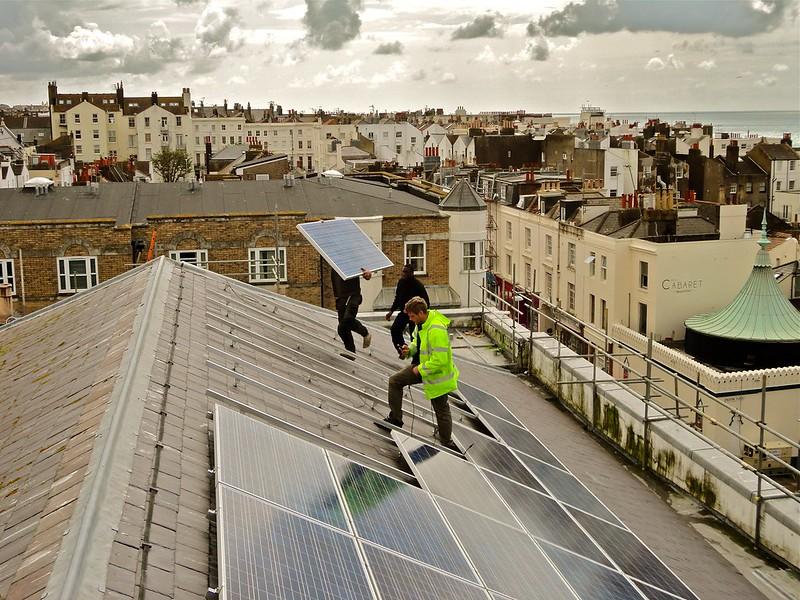At COP26 in Glasgow, national governments committed to revisit their Nationally Determined Contributions the following year. With COP27 underway, Emily Farnworth, Director of the Centre for Climate Engagement (CCE) at Hughes Hall, University of Cambridge, sets out the opportunity for locally determined climate action to support the national agenda.
All eyes are on COP27 this week which is being hosted in Egypt’s Sharm El Sheikh, an area known for its sheltered sandy beaches, clear waters and coral reefs. In stark contrast to this serene setting, the latest science demonstrating where climate change is heading is turbulent – making the urgency to reduce emissions at the required levels crucial.
COP27 is a chance for countries to meet the scale of urgency with the required level of ambition, commitment, and resolve. International climate governance is an essential component of climate action constituting the voluntary mechanisms and measures aimed at preventing, mitigating or adapting to the risks of climate change [1]. As part of this system, the 2015 Paris Agreement set a goal to limit global warming to avert the worst impacts of climate change [2]. This mechanism introduced a pledge-and-review system where countries submit Nationally Determined Contributions (NDCs) setting targets for mitigating greenhouse gas emissions, outline plans on how targets will be reached, and elaborate systems to monitor and verify progress [3],[4].
The agreement requires that NDCs are revised every five years with a ‘ratchet’ mechanism to align political ambition with scientific reality – at COP26 parties agreed to revise the plans just one year later [5]. NDCs are critical – many of the decisions and investments needed to tackle climate change are the remit of national government.
However, while NDCs play a crucial role, climate change has multifarious causes and impacts, and climate governance needs participation across all aspects of society, including at the local level [6]. In the UK, local authorities have started to consider the role of Locally Determined Contributions (LDCs) and how these can accelerate efforts to tackle the climate emergency [7]. Although there is currently no UK-wide government guidance stating that local authorities must set a climate target or report on progress [8], a number of local authorities in the UK are taking the lead on climate change – more than 300 have declared climate emergencies and have developed, or are developing, strategies and action plans to deliver ambitious targets [9].
The potential for LDCs to make a meaningful contribution to the national agenda cannot be underestimated and, I believe, should be supported and enabled at the national level to optimise the outcomes of locally determined action on climate. Local authorities are best placed to understand local context and tailor solutions to their area and the needs of their communities. Place-specific approaches to the delivery of net zero can result in improved economic and social value [10], creating a more favourable environment for net-zero investment. Action driven by local authorities also offers the opportunity to link net-zero interventions with other levelling-up priorities such as health inequality and fuel-poverty.
Standardising approaches to LDCs would certainly bring benefits, enabling appropriate replication across authorities to be aligned to the UK’s NDC to deliver cost efficiencies and provide vital context on how national targets can be achieved. That said, developing a consistent framework will take time and given the urgency of climate change, action cannot be delayed. We can, and should, act immediately at the national level to better understand what local authorities can do now with existing carbon accounting and impact assessment tools – and to develop LDCs that are as aligned as possible to each other and the national framework. Making use of these existing tools, including the Tyndall Carbon Budget Reports, UK Sixth Carbon Budget and BEIS Local and Regional GHG Reporting Estimates, to drive progress on the ground locally will catalyse effective action that brings immediate benefits to both local communities and national targets – while being mindful of longer-term efficiencies delivered by an established framework.

Enabling local action with appropriate powers is essential to optimise the delivery of ambitious national programmes and plans. Developing an LDC is an opportunity for local governments to understand whether existing powers are being fully utilised, and where key powers are lacking. This can inform the level of ambition in an LDC and highlight where increased powers at the local level would enable national level targets to be achieved more quickly and with greater overall benefit. That said, the process of establishing LDCs must consider equity and working collaboratively across local authorities. Engaging stakeholders in decision-making will play an important part in establishing a fair and equitable approach across communities.
National government can take immediate action to support the LDC process by ceding power to local authorities working to deliver emissions reductions with improved social and economic value. Initiatives to bring local authorities together to discuss how best to apply current tools in a consistent way and share ideas on how to fill current gaps in data, reporting and assessment should certainly be supported and facilitated. If national government mandated local authorities to report on GHG targets and programmes, the development of effective methodologies and tools would surely follow. A mandated LDC would also provide clarity around GHG emissions reductions, and help build the investment case for net-zero interventions by local authorities.
LDCs offer an opportunity to drive delivery of net zero with increased economic and social value, deepen our understanding of how the UK’s national commitments can be achieved, and link net zero to a locally relevant place-based agenda. The climate emergency makes it imperative to act as effectively as possible, as soon as possible. Our focus must be on what can be achieved now with the tools available. COP27 presents governments revisiting NDCs with a timely opportunity to recognise and facilitate LDCs as part of the national and global climate agenda.
[1]https://brill.com/view/journals/gg/9/3/article-p385_9.xml
[2]https://unfccc.int/process-and-meetings/the-paris-agreement/the-paris-agreement
[3]https://www.un.org/en/climatechange/all-about-ndcs
[5]https://www.ucl.ac.uk/bartlett/news/2021/nov/cop26-what-happened-and-where-next
[6]https://www.sciencedirect.com/science/article/abs/pii/S0959652617306303
[7]This briefing note focuses on mitigation, but adaptation is also expected to be covered in both NDCs and LDCs.
[8]Scotland and Wales, as devolved administrations have both mandated LA climate change reporting focused on LA operational emissions only, not community wide emissions.



